Chris Baty's Blog, page 261
June 30, 2011
The Great Outdoors
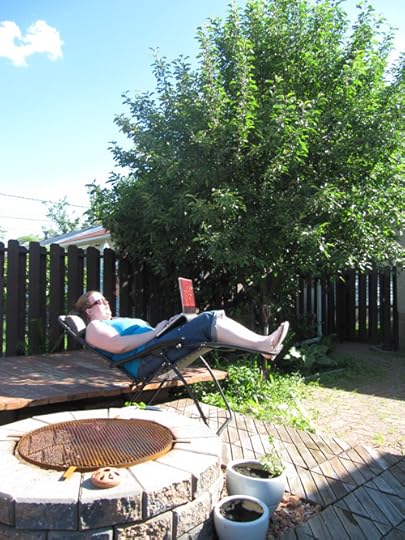
In a nice moment of synchronicity, I'm starting to work full time for OLL just as Camp NaNoWriMo begins. Since I anticipate finding my new job quite time-consuming, I'm not planning on writing a novel in July (we'll see what happens in August), but it works out well for me nonetheless.
You see, this job means I'm working from home full-time. This has many advantages (proximity to refrigerator, world's shortest commute, ability to nap on my lunch break), but also a few disadvantages. For one thing, my husband is a teacher, and he's going to be home all summer, swanning around drinking lemonade and taunting me with his lack of to-do list.
But most of the disadvantages are easily handled by applying the NaNoWriMo tenets of success. Without coworkers around to look busy and guilt me into working, I'm going to have to motivate myself. Good thing I've got all that practice at virtual peer pressure, right? And knowing that all you campers are out there writing alongside me is the perfect motivation.
It's going to be hard to resist the siren song of naps at inappropriate times, but NaNoWriMo helps me out on that front, too. I've spent the last nine Novembers in a state of sleep deprivation, and I've learned how to make it work for me. Having possibly hallucinating campers nearby will definitely help me push through the early afternoon sleepies.
I've also got firm data on the absolute maximum amount of caffeine I can tolerate. As someone whose caffeine tends to come from non-coffee sources, summer is even better for new studies in pushing the limits of caffeine consumption. (There is a Tim Hortons half a block from my house. I'm thinking there will be many iced capp breaks. Non-Canadians unfamiliar with iced capps—they're similar to Starbucks' Frappuccinos, but cheaper!) (Excuse me, there will now be a pause in the proceedings while I go get an iced capp.)
Best of all, starting in the summer when all you campers are working in the great outdoors means I can enjoy something I've never been able to do during NaNoWriMo: write outside! Edmonton is almost always blisteringly cold and snowy in November, but it makes up for it with truly glorious summers. I've got a new house with a lovely deck in the back, located conveniently adjacent to the room with the wireless router. There is absolutely nothing stopping me from working in my gravity recliner in the backyard.
Nothing except my incredibly pasty skin, mind you. Still, that's another good lesson of summer camp I can apply here: wear sunscreen. Nothing harshes the camp buzz like flaming red skin. Sadly, I say this from experience. I went to music camp in my youth and I still managed to get a brutal sunburn one year. At music camp! That's how easily I burn.
So let's get out there and write those novels and enjoy the camp-y goodness. Just remember the sunscreen.
What other principles of NaNoWriMo can I apply to working from home?
– Sarah
June 29, 2011
Sculpting: A Poem A Day Update
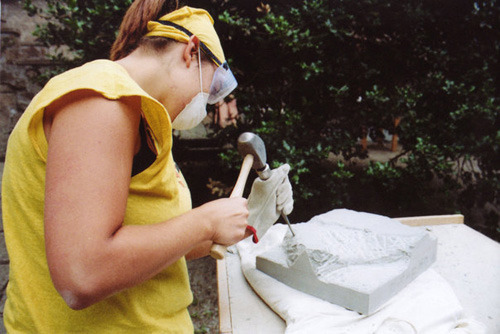
In my senior year of college, I took an advanced creative writing course where we were required to choose a semester-long project and create a writing schedule to produce as much as possible by graduation. My project was approved, but after the first five poems, I hit the wall over and over again. Part of that was because I hadn't thought through my subject well enough, but it was also related to form. I found myself writing randomly inspired poems on the side and growing bitter toward the project. Finally, I spoke to my professor and we agreed that less restriction and focus were what I needed for the last push.
Sure, that meant I didn't finish with a cohesive collection of poems, but I discovered something huge about my writing process. Instead of sitting down to write poems, I started writing pieces of prose that used metaphor, alliteration, repetition, and became lyrical. Then I whittled them down into lines of verse. Like a sculptor who begins with a slab of stone, I began with an entire prose block, then carved away the excess to shape concise language that really mattered for the poem. These poems would often end up in stanzas that were left-aligned because I thought that was what made a poem a poem.
Because the program I'm in now has such an experimental focus, I have learned to look at poetry with a much larger lens and the rebel inside me likes to push the traditional rules instead of follow them. I think it's for this reason and the connection to my crafting process, that I instantly fell in love with the prose poem. Last semester, I read Roxanne Beth Johnson's Jubilee and decided it may just be my favorite collection of poetry! She writes predominately in the prose form, using vivid imagery. I also read Blood and Soap by Lihn Dinh, which blurs the line between poetry and fiction. It reads as a collection of layered, lyrical stories, yet it is often referred to as book of poems.
This has inspired me to use the prose form while writing my daily poems. Some of those poems have taken on a different shape, but getting the content down in that prose block seems to help me stay committed and fulfill my goal (so far). Have you ever met a form that made everything click in a whole new way?
Another exciting part of writing a poem a day is fighting off the self-doubt and taking the NaNoWriMo approach to aim for quantity without the pressure of editing in the moment. I realized that I've seldom given myself such uninhibited time to explore a poem because I normally tend to write with the pressure of presentation on the horizon, and this impacts my work.
Simply doing it is starting to feel a bit easier. My writing muscles are gaining strength and building endurance. I stare at the screen less and less and am more able to jump right in as the days continue. There also seems to be a pattern emerging: I'll write about the same subject for about three days, and I am finally able to hone in on the fourth, unveiling what is hiding in the first few attempts.
That's the update for me right now. I guess a whole lot of writing will help us learn a whole lot about the way we write! What are you learning about your process through attempting a poem a day?
Here is one of my new prose poems:
Clean
my mother buckled the seatbelt, the engine started, I shook. I could die on the drive home or every moment after and go to Hell forever
in the bathroom with her yellow gloves and blue sponge, I asked if she could help me pray for God to scrub my soul wash away my sin leaving a lingering scent of PineSol as proof, so we knelt beside my bed in the middle of the afternoon to signify a special prayer
the words would let me go to heaven- lasting as long as the bathroom stays clean and the carpet is vacuumed from week to week.
– Jenelle
Photo by Bree Tsuleff
June 28, 2011
Calling all revising Wrimos!
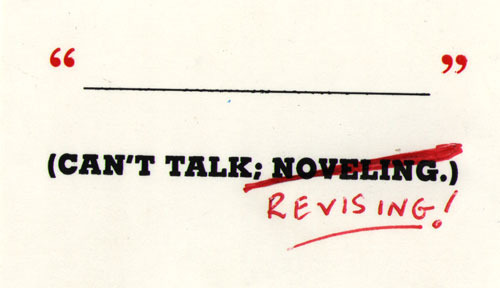
With Camp NaNoWriMo right around the corner, we are in full-on story mode. In just a few short days, people around the world are going to be writing novels. In July! Astonishing.
But there are those of you who won't be participating in Camp NaNoWriMo because you're already working on a project. A revision project. Of a past NaNo-novel, perhaps?
In full support of those who are working toward getting your writing out there, we're offering a giveaway: one slot in Lani Diane Rich's StoryWonk Revision Workshop.
The class is six weeks long, beginning on July 17 and running through August 21.
To get your name in the raffle drawing, just post a comment below with a summary of your revision project! We'll randomly select one winner on July 8.
Good for you, you go-getting, plot-polishing, hole-filling, dialogue-honing, novel-revising lords and ladies of awesome! We salute you.
– Lindsey
June 27, 2011
How to Tame Your Idea!

You're almost home, and the idea hits you like a literary bus. In an instant you can see the whole novel. The cover art. The trailer to the film adaptation. The studio buying you a Mercedes with a vanity license plate.
You get home. You trip over the cat on your way in, such is your fervor to get to a keyboard and pound out this masterpiece. The first draft will be the only draft. It will be perfect.
If you're like me, this is the part where you realize the idea is actually more of a feeling. There are no characters for the idea yet. There is no plot. There is no beginning. There is no end. You begin to dwell on the attractive cover art you imagined earlier. Would it all look better in fuchsia?
When I have an idea that, for one reason or another, I don't understand well enough to write, I have developed a necessarily vigorous plan of attack. I set out to write the stream-of-consciousness stage play version. These plays are awful. I start out knowing nothing. A character enters from stage-left and delivers everything I know about my idea as a monologue to the audience, or an unsympathetic second character. As the dialogue rattles on, I begin to understand where the conflict is.
Before I go on, one interesting way to think about plays: in some ways, they are the dramatic opposite of the novel. A novel, even traditionally speaking, offers you 100 to 1,000 pages to explore conflict. The tradition of noveling encourages fluid changes in setting, time, and perspective.
Writing for the stage, a traditional page count will land you between 80 and 150 pages, and the word count will be the equivalent of less than 25 pages of prose. The form is also encouraging you to use as few scenes as possible, since breaks in a performance are impractical, and suspension of disbelief can become difficult when all your action is necessarily unfolding on one stage.
If you don't understand your idea, writing the oft-recommended prose outline or step chart can be problematic. After all, there's no real form here to keep you on track. I often wind up writing all the things that don't matter in these outlines, which quickly unravel into long descriptions of events and characters I don't yet understand, which, from a dramatic perspective, is quite useless.
A stream-of-consciousness screenplay draft might be helpful for some, but for me this proves too open a form as well. In a screenplay I can avoid making real choices and discoveries by wondering about where the scene should take place, how long it should be, etc. In a film, a scene can last one minute or 15.
There's something about the stage play that is just perfect. You can't get away with a page of playwriting without conflict. The very act of putting two characters on a stage together seems to necessitate conflict. If I simply have these two anonymous characters speak to one another, the conflict that my idea sits atop will usually emerge, wild and curious, covered in horns and hair, from the back of my brain. Sometimes it's really, really ugly, and I go back to thinking about typefaces on the cover art. Other times, I get 50 pages into the stage play, and know all my characters, what they want and what they get. What else do you need to know?
If the idea is destined for a novel or screenplay, the stage play prewrite has a curious way of happening in the past-tense. That is, you may discover that the events your characters have to recount to one another in order to illustrate why they did what they did, or are doing what they are doing, is the real story you want to tell. Then you get to joyously move into a more fluid form that will allow you to bounce around and tell that story.
Poets know all too well the power of formal constraints to draw out creativity and ideas. If you don't know what you're trying to say, rhyme scheme and meter will force you to develop some kind of dramatic inertia, or give up. For me, the stage play is the perfect set of formal constraints.
– Max
Photo by Flickr user Our Hero
June 24, 2011
Rejection Feels Personal

Do y'all ever submit your work anywhere? Do you ever take that chance? I do. I love it. I've got a gambler's shiny pleather, pitty-pat, odds-loving, stakes-raising, rhinestone-sparkly, second-chance, 7-come-11, mama-needs-a-new-set-of-toner-cartridges heart, and submitting stories (and sometimes a novel) to magazines and contests is my personal Vegas.
Having been an actor for a decade or so in my wild youth, I also have a gambler's thick, tortoise-shell, snake-scaly, polyester, pin-striped, calloused, just-one-more-roll, can-you-loan-me-a-contest-entry-fee-until-next-Wednesday skin when it comes to rejection. I'm here to share some of that thick skin with you because I want your work to live in the world if that's what you want. And so: it must leave your house. I bet (as gamblers are prone to do), that you want to send your stuff out if you're not already, and I bet you want to have a bit thicker skin if you are submitting your work. Because if you are, the inevitable is happening; you are being rejected. Welcome to the club! Stacey Richter wrote a beautiful essay about the democracy of this club, "The Chair of Rejection," and the only fee to join is a high five for having the guts to send out your work in the first place. High five!
When I first started sending out my work, I quickly realized I'd need a place to store my rejection notices. This was back in the day when most submissions to literary magazines and contests were made using the traditional mail (that's right, the Pony Express) and acceptance and rejection notices came back the same way. I had a day job then (that's what gamblers call their actual job, to differentiate it from their real work of rolling the dice) and had taken some used folders home for a little project called Organization of My Life. Organization of My Life never quite got off the ground but one of those files, already labeled PERSONAL, was amended a bit and became my rejection notice archive. More than a decade after receiving my first rejection slip (and my first acceptance!), the file is still with me, still holding the notices that I now print out from email form, and still reminding me of what I amended the label to read: REJECTION feels PERSONAL. Because that's all it does. It feels personal, but it's not. A rejection notice is an invitation to take another look at the work and go again. When I get that invitation I always RSVP yes! I hope you do, too.
Despite my gambler's rubber-check heart, I have a very small budget for contests with reader or entry fees and I stick to it. The best advice I've received is much like what we share on NaNoWriMo's I Wrote a Novel, Now What? page about choosing contests carefully, especially when it comes to ones with fees. There are so many places looking for good work that don't charge a fee, that there's no need to mortgage your writing cubby to place the kinds of bets I'm talking about here.
Occasionally, I do put my money down when the prize is calling to me or the organization or cause it supports is deserving (such as "decreasing world suck," like the Vacuum Contests will certainly do). And sometimes, once a year or so, I take a wild chance. But money or no, I've always got something out there because that feeling, of having something out there, is what makes my gambling heart sing.
How about you? Do you have any submissions in the great out "there"? Are you wishing you did? What stands between you and pressing "send"? Do you have a contest entry budget? And what do you do with your rejection notices? Do they decorate your fridge? Line the wastepaper basket? Do you keep them in a scrapbook? If you share your next one with me, I'll send you a high five!
See you in Vegas!
– Tupelo
June 23, 2011
Students' Words in Print

A couple of weeks ago, I received a special delivery from a fifth-grade classroom in San Jose, CA. In November, I had a great time visiting Linda Ulleseit and her students—even though they made fun of me for my then-paltry word count. I was especially excited to see the classroom copy of Novel Central, a collection of Linda's kids' NaNo-novels from the previous year. The delivery I got was the new, wonderful sequel, Novel Central: Volume 2. I've been flipping through it whenever I have a chance, and I am continually blown away by the creativity of these young writers. From the back cover:
These NaNoWriMo novels include something for everyone: dragons, super computers, TacoGuys, robots, unicorns, spy camp, zombies, teenagers, friendships, and even a sewage monster.
I've seen a few collections like this (as well as a lot of books individually published by students), and I believe that they are ideal culminations of the noveling process. The kids and teens who write during NaNoWriMo are shown that their work is real and valuable, and printed copies of their novels can be permanent proof. (Not to mention, educators, that the publication process is an opportunity to teach a whole bunch of real-world editing skills.) As Linda Ulleseit says in her introduction to Novel Central: Volume 2,
The hard work is just a memory now as the class basks in its accomplishment. They each wrote a novel in a month. That is an achievement they can be proud of, one they will remember for a lifetime. Enjoy the fruits of their labors.
In honor of this book and others, tell us about the first time you saw your words in print. How did it make you feel? Was it during your school days, or did it happen later in life? Did someone else love your work, or did you love it enough to self-publish?
And remember, if you still want to see your (or your students') 2010 NaNo-novel(s) in print right away, that special offer from CreateSpace expires on June 30!
– Chris A.
Photo by Flickr user reinvented
June 22, 2011
Farewell, Nancy! Hello, Sarah!

I'm sad to announce that a beloved member of our team, Nancy Smith, will be leaving OLL. Nancy won a creative writing fellowship, and she's heading off to devote herself to full-time fiction writing. Nancy brought so much to the CL position and we owe her a tremendous thanks for all the work she put into making OLL better (and better-looking with her graphic-design talents!) over the past year.
The good news is that we've already found someone great to fill Nancy's shoes. Our very own Special Projects Manager, Sarah Mackey, will be taking over as Community Liaison starting in early July. Sarah is a dream hire. She served as an all-star NaNoWriMo Municipal Liaison in Edmonton for many years, interned for us last summer, and has been doing fundraising and outreach projects for us part-time since then. Sarah is incredibly funny, a huge supporter of our programs, and she lives, eats, and breathes social media. She'll be our first non-US full-time employee, and will be doing her work from a secret bunker in Canada.
As Community Liaison, Sarah will be overseeing our Municipal Liaison program for NaNoWriMo and Script Frenzy, running our Come Write In outreach to libraries and bookstores, captaining our Twitter and Facebook feeds, handling press stuff, and continuing to work closely with Tavia on the Night of Writing Dangerously (along with a million other projects).
Welcome on board, Sarah! And write like the wind, Nancy!
– Chris B.
Live-Tweeting Literature
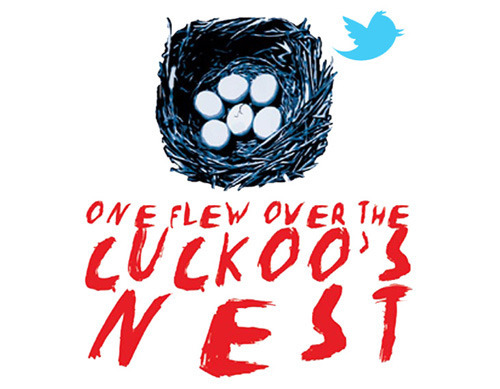
I was stuck at the library with no network the other day, completely paralyzed by my inability to do pretty much anything. I felt like I was in some twisted parable about the dangers of over-reliance on technology.
After several attempts to get the network up and running, we gave up and left it to the IT department. At which point, I started tweeting. I cracked a joke about how it was starting to feel like a 21st century version of an Agatha Christie novel: the longer we were without internet, the more people started turning on each other.
That led to a riff on the idea of an updated And Then There Were None where someone was live-tweeting the proceedings. The idea of the increasingly panicked tweets (and the dismissive @ replies) made me laugh, but then I started thinking. What other books or plays or movies would make for completely surreal and hilarious live tweeting?
Some stories, of course, completely collapse under the weight of technology. (I picture Juliet's friends-locked LiveJournal account with some version of "LOL, going to fake my own death." Romeo, of course, gets email alerts when Juliet updates her LiveJournal, gets the notification on his iPhone, comments "Sweet, see you tomorrow," and the whole thing is over.)
Others, though, would benefit from the additional layer of commentary. Imagine, say, Nurse Ratched tweeting the exploits of One Flew Over the Cuckoo's Next, or Elizabeth Bennet's sharp wit taking down Mr. Darcy 140 characters at a time. (One of my favourite things on the whole internet is Pride and Prejudice in Facebook updates.) Wouldn't you love to read Marvin's travel blog updates about his exploits in The Hitchhiker's Guide to the Galaxy? Ulysses fans are way ahead of me; they celebrated Bloomsday by filtering the 800-page tome into 140 character tidbits.
Which story do you think would be most hilariously improved with the additional layer of live-tweeting or Facebook commentary? Bonus points for example tweets.
– Sarah
June 21, 2011
OLL's Windows to the World
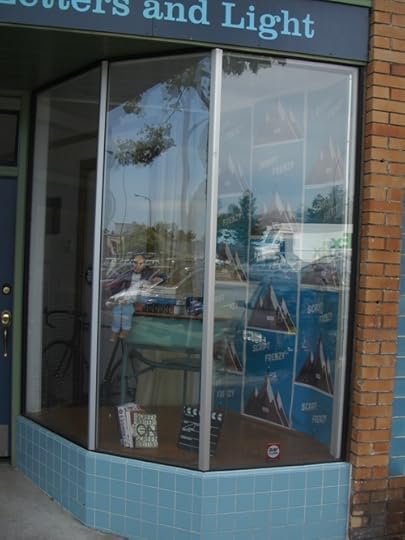
One of the many charms of our office here at 3354 Adeline is its storefront windows on either side of the blue front door. If eyes are windows to the soul, then maybe OLL's windows are the eyes to our soul!
Many people stop and stare as they amble by, making comments like, "What a creepy doll!" Or, "Cool! I wonder what they do here!" Or, "Hey there are people in there!" (All of which leads me to believe that our "soul" is surprising, a little confusing, but very eye-catching.)
In November we decorated our windows in NaNoWriMo finery and invited local writers to come novel in these cozy nooks. (That got a lot of comments from passersby!)

And then, come spring, we dressed up the display in honor of Script Frenzy.
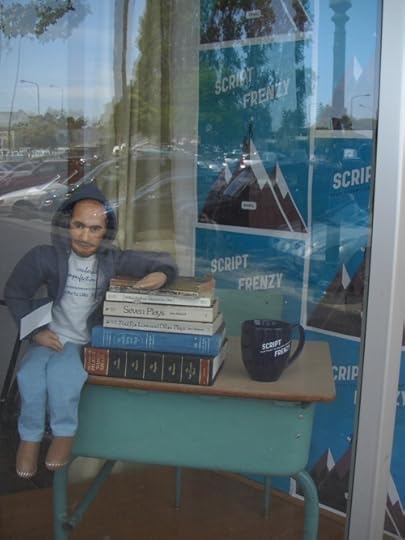
Now, with Camp NaNoWriMo nearly upon us, Tupelo has done an outstanding job of changing the décor yet again to match the season.
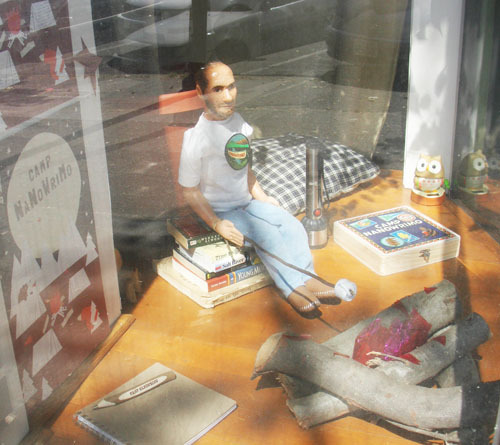
Judging by our new window treatment, summer has arrived and camp is just around the corner!
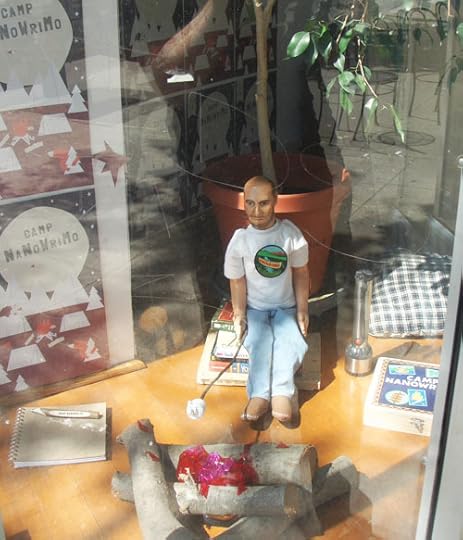
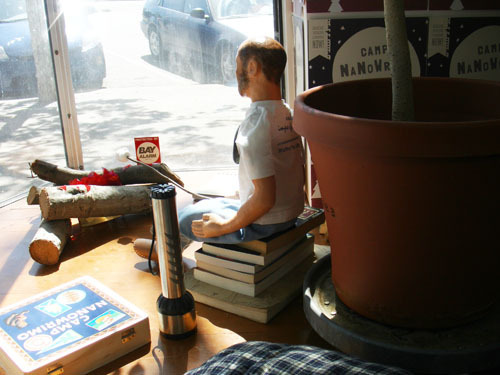
– Lindsey
June 20, 2011
Here to Learn!
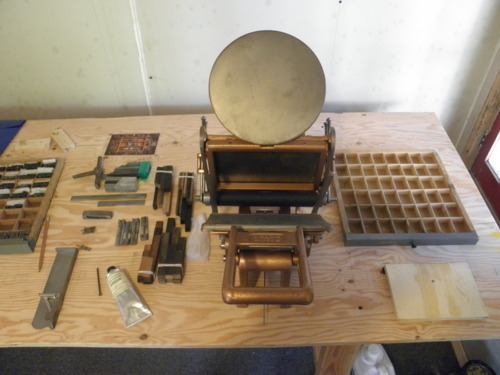
I took a letterpress class this weekend! Remember, back in the day, when I'd just gotten my own letterpress? Thanks to the Center for the Book, I am finally learning how to use it! I had a great time in Letterpress I on Saturday, made some super-cool cards, and came home tired and with paint on my hands. Most awesomely, the prof made sure that we learned how to clean up afterward! This wasn't a Color Me Mine class where we made some sweet art and walked away from our messes, this was the whole nine yards: we made our sweet art, then we put on some gloves and went to work with solvent and rags! I want letterpress to become a part of who I am, so I appreciated this. I need to care for Coppie/Printie (my machine needs a name! see my P.S.!) and I'm glad to earn my chops!
As I near a certain age (cough, sputter), I'm realizing that, even with my supreme optimism about the endless potential of a striving human, there's a limit to the skills we can master in a lifetime. With this in mind, I've started taking classes whenever I can, to at least get a taste of the many wonderful possibilities out there. I know I won't be devoting my life to most of them (and the many pet bowls I made in a pottery class attest to this), but I'm having a good time and finding those activities that I do want to be central to my life.
This year I've taken two dance classes, West Coast Swing and Bellydance, and proven what I'd already suspected: I have two left feet (and two left bellies). Once I got over my embarrassment—which renewed itself for every class, fresh and frustrating (and I'm a blusher!)—I had a great time, or at least most of me did. My brain was screaming: No! Let's go home and do stuff we're good at! Like TV! We excel at TV! But my body was ready to dance, literally, like a fool. Apparently my brain is old and rigid and terrifically afraid of mistakes while the rest of me still feels like a kid and doesn't really care about getting things exactly right. If my brain is my inner editor, the rest of me must be the writer. Learning new things keeps the playing field even for when I sit down in my writing cubby to do my real work.
At first it seemed silly to spend money on these "amenities" (my brain had a lot to say about that—-oh man, does my inner editor like to do math—I have a regular chartered accountant up there), but I haven't regretted a cent! I'm signing up for more classes right now. Some I know won't be a part of my life once the class is over, but are part of the buffet I'm sampling while life allows—specifically, another dance class: Highland Swing! (My brain is already on page 7 of a bulleted and footnoted list about why this is The Worst Idea in the Recorded History of Time, a Waste of Time, and Other Phrases Focused on Time.) And two others that I hope to stick with and become a life-long student of: Tai Chi and Letterpress II, here I come!
How about you? Are you learning anything new? Are there dances, instruments, machines, knitting patterns, you hope to master? I've got my eye on the accordion, even though I don't like prison very much and many bumper stickers have alerted me to the fact that playing one comes with such a sentence. Do you play anything? How did you earn your chops? Do you have fun with your mistakes? Are you a blusher, like me? (How do you overcome that? I mean, seriously, I could have written an entire blog about blushing.) What have you picked up and found, to your surprise, you had a knack for? How does any of this affect your writing? Are there POVss or tenses that allude you? Ones that you've finally got secure in your toolbox? We're here to learn, I say! What have you learned? What awaits you?
– Tupelo
P.S. Name my letterpress! It deserves a christening. For some background, it is a Kelsey and just as beautiful as it looks in this picture! Suggest some names in the comments and if my panel of highly biased experts chooses yours, I'll send you a sample of my newbie letterpress work!
Chris Baty's Blog
- Chris Baty's profile
- 63 followers



